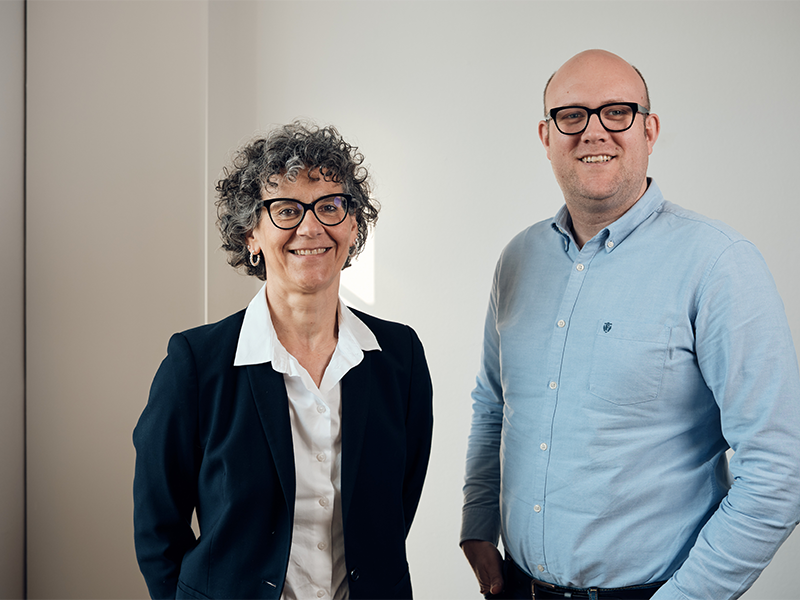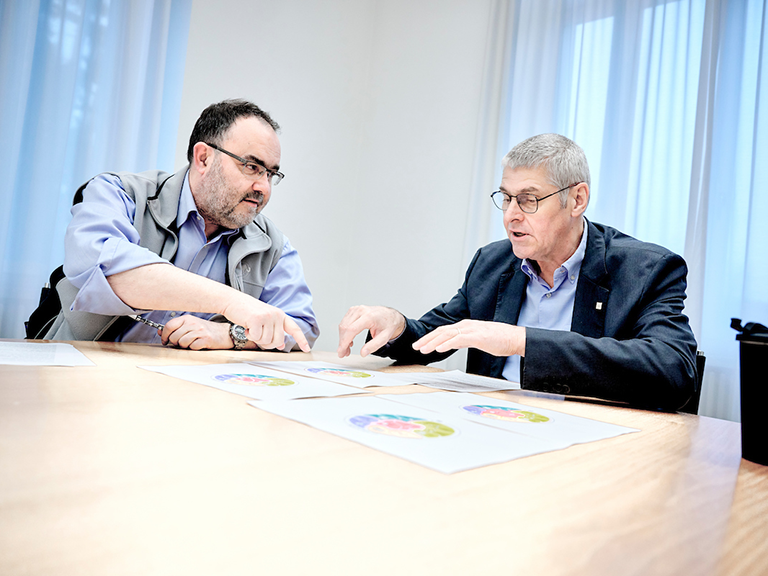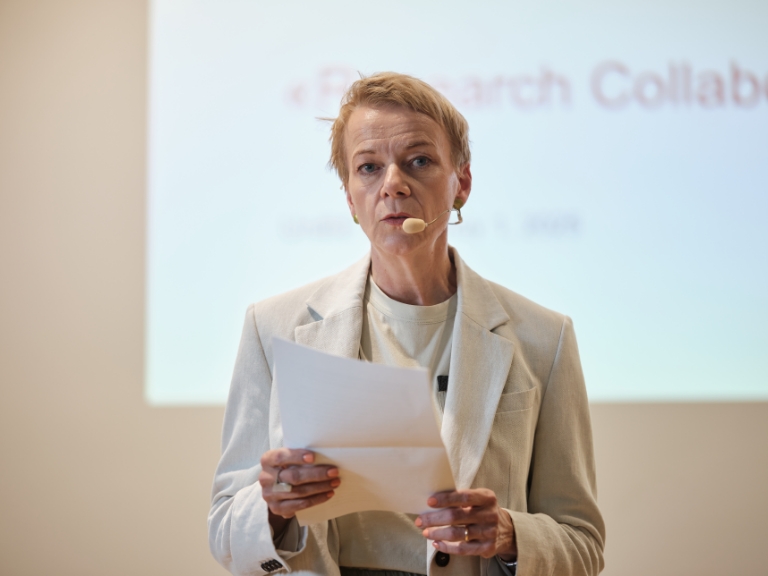Finance and logistics at the University of Bern
With SAP into the future
The University of Bern is rolling out a new data processing system in January 2027 to handle its finance and logistics data. Project managers Claude Johner and Brigitte Aebi, Head of Finances, are convinced that SAP’s software will help them tackle administrative challenges.

Many different departments are very closely intertwined in modern-day companies – from procurement and production to accounting and human resources management. Long gone are the days when simple tools like Excel tables and notebooks were good enough to efficiently manage and transparently document these processes. When it comes to issues like data consistency, scalability and collaboration between several offices, these tools quickly reach their limits.
Enterprise resource planning (ERP) systems like those devised by SAP offer an integrated solution that lets a company centrally plan and control all of its resources, including material, staff, time and capital. In fact, since all parts of the company access one common database, this approach prevents redundancies, boosts efficiency and simplifies sound decision-making.
Claude Johner, as project manager, and Brigitte Aebi, as Head of Finances, are in charge of the SAP rollout in finance and logistics at the University of Bern.
Claude Johner: The operating system currently in use is outdated and in need of a complete overhaul: The University of Bern has some catching-up to do. Because of this, the University Executive Board decided in August 2023 to roll out SAP on January 1, 2027, and therefore replace FIS, the financial information system currently in place.
Subscribe to the uniAKTUELL newsletter

Discover stories about the research at the University of Bern and the people behind it.
Most higher education institutions in Switzerland already rely on SAP to manage their administrative processes. That means we didn’t just pick some “random” application – we selected a state-of-the-art, scalable system for planning enterprise resources that is already in widespread use. SAP is the global market leader for this kind of system and it’s also being used by the Canton of Bern. The University of Bern will use the same server infrastructure as the Canton of Bern and will be able to benefit from existing expertise. What’s more: SAP is already in use in the Human Resources Office, so we can also draw on their experience.
MORE ABOUT SAP
SAP stands for Systems, Applications and Products in Data Processing. It is a German software company that has specialized in enterprise software for managing the full array of business processes – in areas like accounting, logistics, human resources and production. In the broader sense, “SAP” is also frequently used as a shorthand reference to the ERP (enterprise resource planning) software developed by SAP. SAP will simplify process management and execution within the University. The rollout of SAP as an ERP system for finance and logistics should help the University of Bern efficiently plan, manage and monitor its resources.
Brigitte Aebi: SAP won’t make everything easier, but it’s a step in the right direction and toward achieving greater process efficiency in the medium to long term. Evaluations and analyses are currently time-consuming, if they’re even possible at all. With SAP we are developing a cost accounting system that provides us with the basis we need to perform certain evaluations and analyses. Even our financial reporting will improve substantially – it currently leaves much to be desired since it lacks a sound cost accounting system.

Brigitte Aebi: There are two points I’d like to mention: First of all, we expect an enormous amount of process standardization; second, we will be able to integrate these processes into a single system. The current FIS system’s lack of end-to-end integration results in large number of user inquiries and is highly time-consuming for the maintenance team in charge.
Why?Brigitte Aebi: If processes aren’t integrated, users often need to enter or compare data multiple times. That results in uncertainty, mistakes and inquiries. In terms of user friendliness and data analysis, SAP therefore represents a huge step forward. But some processes will also become more complex.
Will SAP bring any other advantages?Claude Johner: The SAP rollout will allow the University of Bern to boost its attractiveness as an employer in administration since anybody with SAP experience is more versatile on the job market. It will also make it easier for us to find specialists – for finance processes, for example.
Can all current FIS users be integrated seamlessly or is SAP a workforce reduction project?Brigitte Aebi: The SAP@UniBE project isn’t being implemented with the goal of reducing staff or outsourcing work. Experience at the Canton of Bern and other higher education institutions has shown that no downsizing has taken place. For those of us in the Finance Office, the project certainly constitutes a profound change, but we’re walking this path together and receiving excellent support from the project team.
“SAP isn’t being rolled out with the goal of reducing staff or outsourcing work.”
Brigitte Aebi
What kind of support is that?Claude Johner: In light of the University of Bern’s decentralized structure, it was important for us from day one that we get the roughly 150 institutes and 500 people on board who deal with finance. In May 2024, the institutes were able to appoint one contact each to communicate with SAP’s project team. These contacts receive information from the projects, which they pass on to their respective organizational unit, and they can also contribute to the project by raising questions and issues from the institutions. In addition, we are focusing on a series of events and training sessions within the faculties. We also set up an SAP microsite and project management is keeping the individuals involved in the project updated on a regular basis. The individuals responsible for finances at the institutes also receive a monthly letter.

Claude Johner: We see a great deal of potential in Fit for Future – especially with respect to the “Rethinking University structures” field of action – for working together with the decentralized units to find efficient finance management solutions for the long term. In the short term, however, it’s certainly up to the Finance Office to provide SAP training for any employees in the institutes who come in contact with the finance and management processes.
“The SAP rollout will allow the University of Bern to boost its attractiveness as an employer in administration.”
Claude Johner
What kind of feedback has there been so far from the employees involved?Brigitte Aebi: The basic tenor is positive and the feedback encouraging. There’s been criticism, too, of course: And that’s good. Because then we can discuss that input in the project team and look for solutions. Since we’re aware of the fact that changes can be challenging and that the employees need support throughout the process, sufficient information and training should also be provided. We're trying to take the specific needs and requirements of the individual institutes into consideration. What’s absolutely essential, however, is that we achieve a certain degree of standardization with SAP, since that will reduce the operating expenses for maintenance and support.
If I don’t work in finance – will the SAP rollout still impact me?Brigitte Aebi: If you don’t have to deal with an operational credit or third-party grant, probably very little. But nearly every employee has to use eForms as a processing tool in finance and human resources. This approach is well-established and will be kept.
Is our SAP rollout proceeding according to schedule?Claude Johner: The project’s original target was to have the rollout take place in January 2026. However, we needed three months longer than planned for the conceptual phase, which meant that the implementation phase would have been too short. We decided to set our go-live date for January 1, 2027, as a result.
About the person
Brigitte Aebi
studied economics and business administration at the University of Bern. She has held various management positions in finance and controlling over the past 32 years and has headed up the Finance Office of the University of Bern since 2020.
About the person
Claude Johner
studied business (Bern University of Applied Sciences) and is a qualified auditor with extensive experience in the areas of finance processes and SAP projects. He has been managing the Finance Systems team at the University of Bern and the SAP@UniBE project since April 2024.


